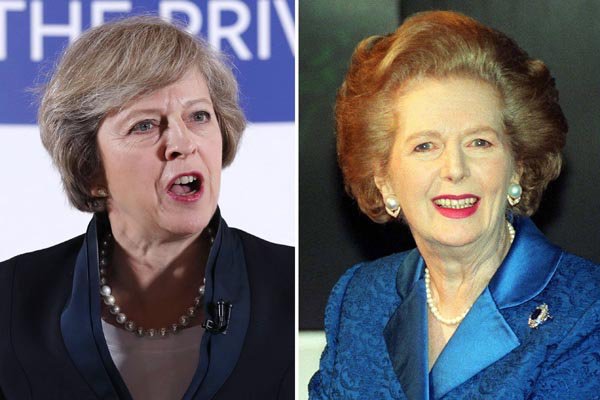
British Prime Minister Theresa May has drawn comparisons to Margaret Thatcher after she outright rejected Irish and Scottish concerns over Brexit and moved to quash the right of Irish and other EU citizens to live and work in Britain and the north of Ireland.
Signalling an unbending line in negotiations with the European Union, she said the Brexit referendum in favour of leaving the EU was a rejection, not just of the EU, but of the entire social and economic order.
In a hard-right speech to her party’s conference in Birmingham last weekend, she came out strongly in favour of the Brexit vote, which she said was a vote not just to change Britain’s relationship with the EU, but “a change in the way our country works - and the people for whom it works - forever.”
In June, England and Wales voted in the referendum to quit the EU, while the Six Counties of Ireland under British rule, and Scotland, voted to remain.
May this week set a deadline of the end of March for triggering Article 50, to irreversibly begin the British exit from the EU. She also declared that there would be no possibility for any of the “four nations” -- with the Six Counties implicitly identified as one ‘nation’ of the four -- to prevent it.
“There is no opt-out from Brexit. And I will never allow divisive nationalists to undermine the precious union between the four nations of our United Kingdom,” she declared, without irony.
Labour leader Jeremy Corbyn said she was “fanning the flames of xenophobia and hatred in our communities and trying to blame foreigners” for her party’s own failures. Scotland’s Nicola Sturgeon said May’s speech and the policies she laid out were “the most disgraceful display of reactionary rightwing politics in living memory”.
Opposition parties also said the Conservatives had shown themselves to be racist and narrow-minded by calling for companies to make public the names of non-British workers they employ, including Irish workers. And for the first time ever, there are now questions over the immigration status of Irish citizens living and working in the north of Ireland.
But Jeffrey Donaldson, the DUP MP for Lagan Valley, welcomed the “clear timetable” for Britain’s exit from the union.
“I do think we need to get on with it now,” he said. “Further uncertainty and a further period where people don’t know what’s going to happen, where there isn’t a negotiating process that people can focus on, doesn’t help anyone. I think it’s good that we’ve got now a clear timescale to move this forward.”
Ireland’s leading expert on Brexit warned Britain’s new hardline stance on exiting the EU could bring a remilitarisation of the border between the Six and 26 Counties.
“My worst fears have been realised. It is somewhat staggering what they are doing in the UK,” said Edgar Morgenroth, a research professor and an adviser to the Dublin government on Brexit.
“This hard Brexit line by London potentially imperils the Common Travel Area. The British can decide to allow Irish people to travel to the UK. They can do what they want. But we can’t reciprocate under the EU rules.”
Any decisions on new policy with Britain will be taken collectively by Ireland with the other remaining EU countries, he noted. He said he believed a “soft border” is likely now out of reach because it is incompatible with May’s plans.
“There is a lot of deviousness happening in their public statements from the British side, saying that we want to maintain a soft border and then doing the opposite. It is not consistent. They are trying to portray the situation in a different way than it really is,” he said.
The Dublin government has announced that it is setting up a civic dialogue to be held in Dublin, on November 2nd. It will involve political parties, business groups and non-governmental organisations from both parts of the Ireland, although the DUP has said it will boycott it.
This week, the High Court in Belfast heard evidence that Brexit will have a “catastrophic” impact on the peace process in the north of Ireland. Lawyers for the father of a loyalist paramilitary murder victim warned Brexit would cause constitutional upheaval and demands for a united Ireland.
Referring to the terms of the Good Friday Agreement, Ronan Lavery QC said: “A change so profound as withdrawing Northern Ireland from the European Union requires the consent of the people of Northern Ireland.”
Sinn Fein is one of the parties to the legal challenge. It is also organising protests at Brexit in border areas, from Derry to North Louth, as part of the ‘Border Communities against Brexit’ umbrella group.
Martin McGuinness, Sinn Fein’s deputy first minister for the Six Counties, said Britain was facing a “head-on collision” with the EU over Brexit, and suggested the north of Ireland was likely to be “collateral damage”. He predicted that the London government’s demands in negotiations with Europe would not be met, making it less likely that Brussels will let the open border remain.
“We have all been concerned for some time at the direction the government is going to take,” he said. “It is very disturbing.”
![[Irish Republican News]](https://republican-news.org/graphics/title_gifs/rn.gif)
![[Irish Republican News]](https://republican-news.org/graphics/title_gifs/harp.gif)

